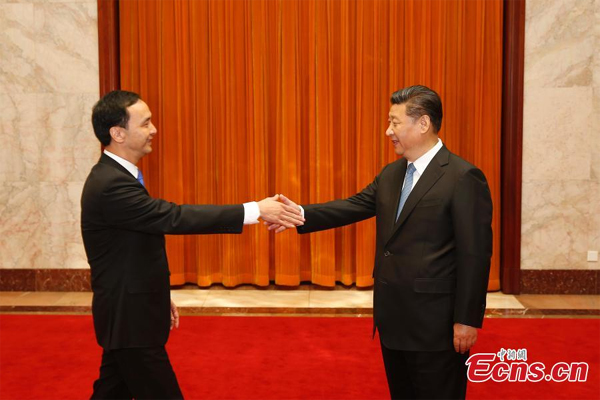Xi meets visiting KMT chairman
(Xinhua) Updated: 2015-05-04 12:35
It all started in 2005, when Hu Jintao, then general secretary of the CPC Central Committee, met the former KMT chairman Lien Chan in Beijing, and the annual cross-Straits Economic, Trade and Culture Forum was inaugurated. Communication were further enhanced after Ma won the island's leadership election three years later.
By taking part in the CPC-KMT leadership talks and the Cross-Straits Economic, Trade and Culture Forum, Chu is signaling his strong intent to carry forward the consensuses that have been reached and to push for peaceful cross-Straits development. More, his visit to Beijing is likely to boost friendly relations with Xi, thus consolidating the mutual trust.
More importantly, both leaders will pledge to adhere to the 1992 Consensus, which acknowledges that the mainland and Taiwan belong to one China. The Consensus has served as a cornerstone for cross-Straits exchanges over the past two decades. Chu reiterated in the Hong Kong Special Administrative Region last month that the KMT's stance on the Consensus will be consistent and his party will continue its exchanges with the CPC.
The opposition Democratic Progressive Party claims that the KMT's defeat in the elections last year was because of its mainland policy. However, it not yet found a proper alternative of the Consensus, which it refuses to adopt. Should Tsai Ing-wen, the DPP's chair, win the island's 2016 leadership election, it will deal a deadly blow the political basis of the cross-Straits development at a price that Taiwan cannot afford to pay.
Chu's adherence to the Consensus, on the other hand, may help his party to gain more support in the upcoming election.
Over the last seven years, the KMT has taken advantage of the business opportunities offered by the other side of the Straits, in a bid to boost the local economy. Given the various difficulties that the island has to deal with, Chu should be able to reacquire public support especially from small business owners by promoting such things as the Asian Infrastructure Investment Bank the mainland's new FTZs.
The mainland has welcomed Taiwan joining in the Beijing-initiated AIIB under a proper name, as well as cooperation with the newly approved Free Trade zones in the mainland’s Guangdong and Fujian provinces.
These reflect Taiwan's real position in the aforementioned regional economy boosters, and indicate that the KMT gives priority to the well-being of local people and related industries.
Such being said, Chu's mainland visit will surely boost the morale of his party and his own image, if local media outlets report about it responsibly. Of course, that requires him to make timely announcements of what has been achieved in his meeting Xi.
The author is a professor with the Institute of Taiwan Studies, Beijing Union University.
- Govt encourages people to work 4.5 days a week
- Action to be taken as HIV cases among students rise
- Debate grows over reproductive rights
- Country's first bishop ordained in 3 years
- China builds Tibetan Buddhism academy in Chengdu
- Authorities require reporting of HIV infections at schools
- Typhoon Soudelor kills 14 in East China
- Police crack down on overseas gambling site
- Debate over death penalty for child traffickers goes on
- Beijing to tighten mail security for war anniversary








